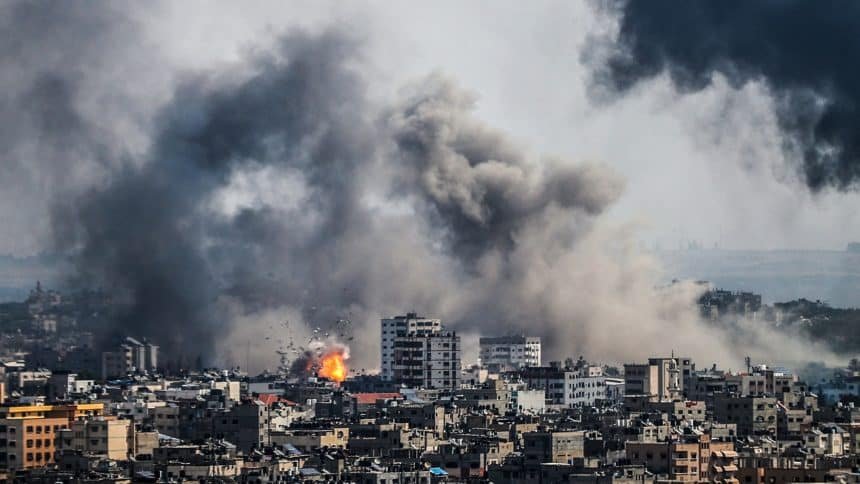The war between Israel and Hamas has reached its 100th day, with Israeli Prime Minister Benjamin Netanyahu declaring that no one will be able to stop them from destroying the militant group.
The ongoing conflict has caused a humanitarian crisis, resulting in over 23,000 reported deaths in Gaza and significant destruction in the Palestinian territory.
There are growing concerns that the fighting could spread to other parts of the region. In addition, fresh strikes have targeted Iran-backed Huthis in Yemen, as they have threatened to carry out more attacks in support of Gaza against Israeli-linked Red Sea shipping.
The US Central Command has confirmed that they have targeted a Huthi radar site, following previous strikes by US and British forces on rebel sites in Yemen.
The war in Gaza began on October 7, when Hamas militants launched an unprecedented attack from the Gaza Strip, resulting in approximately 1,140 deaths in Israel, mostly civilians, according to official figures reported by AFP.
Hamas, which is considered a terrorist group by the United States and the European Union, has taken around 250 hostages. Israel claims that 132 of these hostages are still in Gaza, with at least 25 believed to have been killed.
Israel has made a commitment to eliminate Gaza’s Islamist rulers and has launched a relentless bombardment. According to the latest figures from the territory’s health ministry, this bombardment has resulted in the deaths of at least 23,843 people, the majority of whom are women and children.
During the hearings at the International Court of Justice in The Hague, Israel was accused of violating the UN Genocide Convention. Despite this, Netanyahu remains firm in his belief that no court or military adversary can prevent Israel from achieving its goal of destroying Hamas.
“No one will stop us — not The Hague, not the Axis of Evil and no one else,” he told a televised news conference on Saturday, referring to the Iran-aligned “axis of resistance” groups in Lebanon, Syria, Iraq and Yemen.
“It is possible and necessary to continue until victory and we will do it,” he added, saying most Hamas battalions in Gaza had been “eliminated”.
Netanyahu is under increasing internal pressure to bring back hostages who have been detained in Gaza for 100 days, with hundreds gathering in Tel Aviv to demand their release.
“We will continue to come here week after week until everybody is released,” Edan Begerano, 47, told AFP.
On Saturday, health authorities in Gaza said that Israeli attacks had killed at least 60 Palestinians.
Nimma al-Akhras, 80, recounted one of the hits that damaged her house.
“We started to scream and I couldn’t move but someone pulled me out and put me on a cart,” she said.
In air attacks on Khan Yunis, Gaza’s largest southern city, the Israeli military said it hit dozens of rocket launchers that were “ready to be used” in central Gaza and killed four “terrorists”.
It also stated that its engineers had demolished a Hamas “command centre” in central Gaza.
Mourners gathered in Rafah’s Al-Najjar hospital to pray over the bodies of deceased relatives.
One man, Bassem Araf, held out a photograph of a toddler.
“She died hungry with bread in her hand. We tried to remove the bread from her hand but it was held tight,” Araf said.
“This is the resistance they are targeting in Gaza, just children.”
The Israeli blockade in Gaza has caused severe shortages of food, water, medicine, and fuel. As a result, the health system in Gaza is collapsing.
Philippe Lazzarini, the head of the UN agency for Palestinian refugees, expressed his concern during a visit to Gaza, stating that the destruction, displacement, hunger, and grief experienced in the last 100 days are tarnishing our shared humanity.
He also warned that an entire generation of children in Gaza is being traumatized, diseases are spreading rapidly, and famine is imminent.
The dire humanitarian situation has been worsened by winter rains, leading to the displacement of approximately 1.9 million people, which accounts for nearly 85 percent of the population. Many of these displaced individuals have sought shelter in areas like Rafah, where the health ministry lacks the necessary infrastructure to support them.
The health ministry spokesman in Gaza accused Israel of intentionally targeting hospitals to render them inoperable, which would have devastating consequences. However, hospitals are protected under international humanitarian law, yet they have been repeatedly hit by Israeli strikes.
The Israeli military claims that Hamas operates command centers in tunnels beneath hospitals, an allegation that Hamas denies. According to the World Health Organization, less than half of Gaza’s hospitals are currently functioning, and even those that are operational are only partially so.
In terms of telecommunications, there has been a partial restoration of services in Rafah, following a recent outage reported by Gaza’s main operator, Paltel.
Paltel has not yet confirmed the service restoration but did report that two of its employees were killed by an Israeli strike while they were repairing the network in Khan Yunis.






